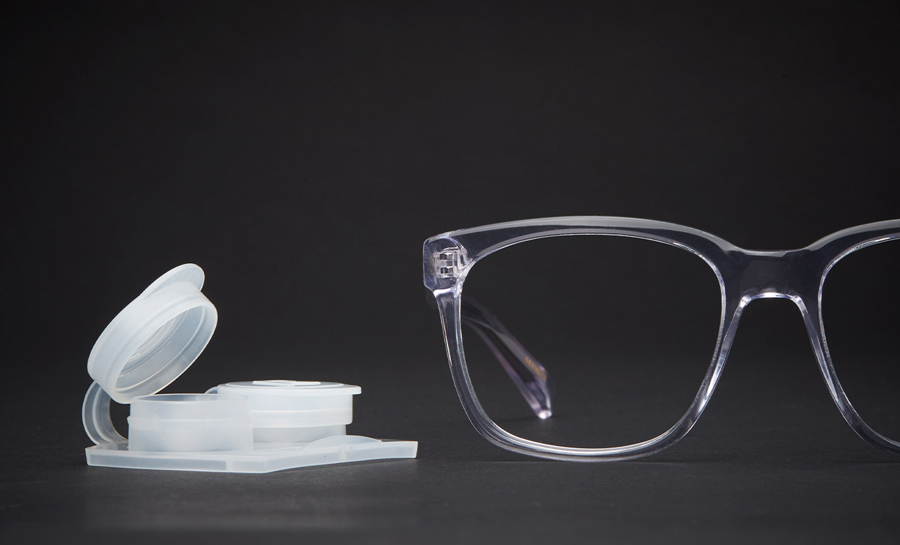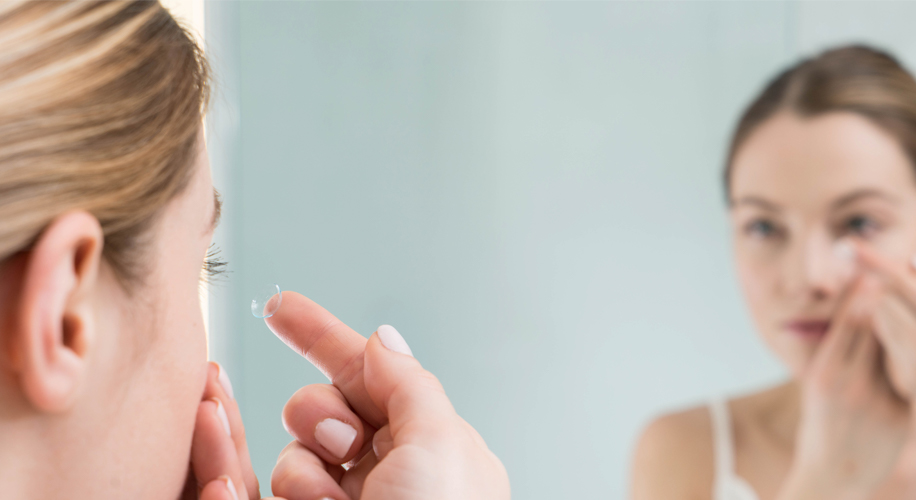Contacts vs. Glasses: Which is Right for You?
- BY Kelsey
- IN Contact Lenses

Contacts vs. glasses—which is better? It’s the age-old debate and one we get asked about a lot. While we obviously have our bias, whether you choose contacts or glasses for vision correction largely depends on your personal preferences, like comfort, convenience, and lifestyle.
To help you make the right decision on whether contacts or glasses are best for you, we’ve broken down the pros and cons of each.
CONTACTS
Choosing the Right Contact Lenses
According to the Centers for Disease Control, more than 45 million people in the U.S. wear contact lenses. This could partly be because using contact lenses is easier than ever, thanks to the wide range of options available. To wear and purchase contact lenses, a contact lens prescription, which is different from a prescription for glasses, is required from your eye doctor and needs to be updated once a year. Your optometrist can recommend whether your vision is better suited to hard or soft lenses, and whether you should choose extended-wear contacts, disposables, or multifocal lenses.
Caring for Your Contacts
While some contact lenses need less maintenance than others, most require daily disinfecting, cleaning, and storing. Plenty of multipurpose contact lens solutions make it quick and easy, but in order to avoid eye infections it’s important to keep contacts cleaned and replaced on the recommended schedule. Daily disposables are perhaps the most maintenance-free option since they offer one-time wear with no cleaning or storing required. Even if you wear contact lenses, you will still need a pair of prescription glasses for back-up, to give your eyes regular contact lens breaks, or just to change up your style!
Contact Lenses Comfort
Contact lenses are generally safe and comfortable for most wearers. If worn too long during the day, contacts can cause the eyes to become dry and irritated, so it’s a good idea to take them out before bedtime to give your eyes some quality “breathing” time. Dry eyes can also be further aggravated by the season of the year, older age, alcohol consumption, and even antihistamine use for allergies.
While some eye discomfort while wearing contacts stems from incorrect placement and is easily remedied, eye pain or serious discomfort should be taken seriously. Issues like corneal abrasions, which can occur when a particle gets trapped beneath the contact lens and causes it to scratch the cornea, can be very damaging.
Wearing Contacts for Sports
Are contacts better than glasses for exercising or sports? In many cases, yes. Unlike glasses, contacts don’t get in the way when you’re working out or playing sports. They also don’t fog up like glasses, and may provide better vision since they cause fewer obstructions and distortions in your field of vision. However, since contacts cover the eye’s surface they reduce the amount of oxygen that reaches the eye. This can contribute to dry eye syndrome and make it worse.

GLASSES
Choosing the Right Glasses
Convenient and portable, glasses are a practical solution to vision that intersects with low-maintenance fashion. From rimless glasses to colorful acetate frames, wearers have endless choices to suit your features and personal style. It’s also easy to add customized lens options like blue light protection, photochromic (which allow lenses to darken in the sun), and anti-reflective coating. All of these help your eyes function better in different settings.
Glasses aren’t always the favorite option for those with higher prescriptions, since the increased weight of thicker lenses can be bothersome. They can also cause some people to have unfocused peripheral vision.
Caring for Your Glasses
Glasses also typically cost less than contacts overall. Unlike contacts, they last longer, don’t require pricey cleaning solutions and you don’t need to reorder them on a regular schedule. In general, a good, quality pair of glasses should last several years, with little maintenance other than regular cleaning and safe storage.
Glasses Comfort
The key to glasses comfort is a proper fit and correct prescription. A poorly-fitting pair of glasses may cause discomfort on the bridge of your nose or behind your ears. Always ensure you have an updated prescription, correctly measure PD, and you took time to properly adjust your new glasses.
In addition, glasses can provide some protection from environmental factors, like dust or other debris. They also don’t worsen issues like dry eyes and allergies, and wearing them actually reduces the risk of eye infection or irritation since they don’t touch the surface of your eyes. In fact, plenty of contact wearers temporarily switch to glasses when experiencing eye infections or when they simply need a contact lens vacation.
Wearing Glasses for Sports
If you play high intensity sports, you may need to opt for a separate pair of prescription sports glasses since regular glasses may not hold up. Glasses can be a nuisance when they fog up while playing sports, in cold weather, or when the temperature changes. On the bright side, you won’t risk losing a contact lens in the middle of a big game!
So, which do you prefer in the contacts vs. glasses debate? Tell us in the comments if you’re a contacts fan, a die-hard glasses wearer, or you wear both!
